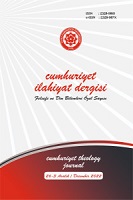Orta Çağ Batı Yahudi Felsefî Düşüncesinde İbn Sînâ’nın Etkisi ve İbn Sînâcılık
Avicenna’s Impact on Medieval Western Jewish Philosophy and Avicennaism
Author(s): Mehmet Ata AzSubject(s): Metaphysics, Jewish Thought and Philosophy, Philosophy of Middle Ages, Philosophy of Religion
Published by: Cumhuriyet Üniversitesi İlahyat Fakültesi
Keywords: Philosophy of Religion; Avicenna; Jewish thought; Translation; Necessary Existent; Soul; Creation;
Summary/Abstract: The translation process from Arabic to Hebrew, which started in the XIth century and accelerated in the first quarter of the XIIth century, continued until the end of the XVIth century. In this period, the philosophical and theological works of prominent Muslim philosophers such as Fārābī, Avicenna, Ghazālī, and Averroes were translated directly or through intermediary languages into Hebrew. In this translation process, Jewish scholars and translators who knew Arabic, on the one hand, translated the works they chose from different fields into Hebrew; on the other hand, they played a facilitating role in meeting the Jewish scholars with the heritage of Islamic thought with the Hebrew works they wrote using Arabic works. Because of the limited number of works translated into Hebrew, the prevalence and influence of Avicenna's philosophical views among Jewish scholars are more limited than that of the Latin translation process, yet his impact on Jewish scholars on different philosophical issues is undisputed. It would not be correct to limit Avicenna's influence and prevalence among Jewish scholars to only the translation of his works into Hebrew, mentioning his name directly in the works of Jewish thinkers and quoting directly from his related works. Considering the similarity of views, concepts, and styles between Jewish thinkers and Avicenna on philosophical and theological issues, it can be argued that a movement called Jewish Avicennaism emerged. However, this movement is not as strong and widespread as Latin Avicennaism. Avicenna's influence among Jewish thinkers was in the form of criticism and rejection as well as adopting the philosopher's views to their philosophical system, similar to those of the Latin thinkers. In this study, I will discuss Avicenna’s role in and contribution to the development of Jewish philosophical and theological thought between the XII-XIVth centuries, a topic that has not been sufficiently addressed in Turkish. After giving general information about the translation process of Avicenna's works into Hebrew, I will try to find the answer to why all or at least essential works of Avicenna were not translated into Hebrew. Then, I will try to determine the impact of Avicenna's intellectual legacy on Jewish thinkers by dividing them into three different periods through concrete examples. The study revealed that although Jewish scholars defend similar teachings to Avicenna's views, they do not mention Avicenna's name and works in their works due to different reasons and concerns, making it difficult to determine the source of their opinions. In addition, the wrong attribution of some Avicenna’s philosophical teachings to Aristotle, negatively affected the recognition and spread of the philosopher's views. Based on these, it is not correct to conclude that his philosophical views were not known, adopted or influenced by Jewish thinkers. On the contrary, when the course of Avicenna's thoughts among Jewish thinkers is examined, it can be said that there are two types of Avicenna understanding in general. The first of these is those who read Avicenna’s works and adopt his philosophical views and make direct references to his work. Quoting Avicenna's views directly in their works revealed that the views among Jewish thinkers, whose belonging is unknown, belong to Avicenna. Secondly, they are Jewish thinkers with eclecticist approaches, who quote and use some of Avicenna's views on issues that they see as compatible and consistent with their philosophical views. They used the arguments and doctrines of Avicenna, whose views they partially knew, as an alternative or starting point against the opinions of the scholars they wanted to criticize or reject.
Journal: Cumhuriyet İlahiyat Dergisi
- Issue Year: 26/2022
- Issue No: 3
- Page Range: 1091-1109
- Page Count: 19
- Language: Turkish

